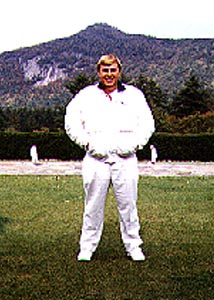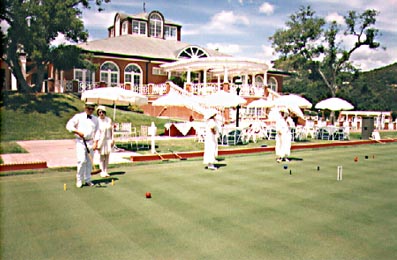

|
Back to |
| The Front Page |
| 1997 Archives |

UNDERDOG YANK TEAM SET TO FACE BRITISH
JUGGERNAUT IN 1997 SOLOMON TROPHY
MATCHES IN THOUSAND OAKS, CALIFORNIA
by Bob Alman
With final American selections confirmed for the Solomon Trophy matches between top-level British and U.S. teams, the games are set to begin Monday, April 7, in Thousand Oaks, California, at Sherwood Country Club, continuing for five days. CROQUET WORLD ONLINE MAGAZINE will send in several reports during play, as well as a final report and picture story the week following. We'll also report the one-day American rules Presidents' Cup to be played on Saturday, April 12, at Sherwood, and we'll publish several dispatches from the Carter Cup matches between American and Irish teams beginning in Palm Beach, Florida, April 15-19.The USCA Selection Committee has formally announced the final and confirmed selections for the Solomon Trophy:
Phil Arnold (Northern California) Don Fournier, Jr. (Arizona) Mik Mehas (Southern California) Wayne Rodoni (Northern California) Jerry Stark (Northern California) John Taves (Washington state). Jerry Stark will captain the American team, John Taves will coach, and Anne Taves will serve as team manager.
England's Robert Fulford, for several years the undisputed top player in the world as reflected in the World Croquet Federation Rankings, anchors a powerful British team.Although this is the strongest team the Americans can put together (as measured by current WCF world rankings), it does not compare well in strength with the British team roster. The British have put together an exceptionally powerful team, headed by the top-ranked player in the world, Robert Fulford, with teammates Chris Clark, Steve Comish, David Openshaw, Mark Avery, and Ian Burridge. Bill Lamb, former Chairman of Council of the British Croquet Association, is the non-playing team captain. Only one of the British team, Ian Burridge, is ranked below the three top Americans - John Taves (#23), Jerry Stark (#30), and Wayne Rodoni (#32).
TEAM ORDER TO BE REVEALED ON FIRST DAY OF PLAY
Official world rankings, however, will not necessarily set the critically important order of play. The ranking of each team - #1 through #6 - is revealed by the captains of the teams simultaneously immediately before Monday morning's start of play. Equally ranked players from each team will play out the 12 singles matches in groups of two. That is, the American #1 and #2 will play the British #1 and #2, the #3's and #4's will play, and so on. In the doubles, ranking is not a factor, as there is a round-robin of nine matches, each of the three doubles partnerships playing the opposing three doubles partnership.
Sherwood Country Club, site of the 1997 Solomon Cup matches between the U.S. and Britain, is nestled in the hills of Thousand Oaks, California, about half way between Hollywood and Santa Barbara. Unexpected team rankings in the past have been explained by such factors as "current playing form," "proneness to jet lag," and recent or even current illness. (In England in 1995, the entire U.S. team was felled early in the week by a stomach virus, and the event went only to 18 matches, all of them won by Britain, with three matches left uncompleted.)
The worst results for the Americans have always been in Britain. In 1991 and again in 1994 the Americans managed to win 7 of the 21 matches on home turf in Palm Beach, their best record so far.
The American team wipe-out at the MacRobertson Shield last year in Britain should not be viewed as a backward step in the increasing level of American expertise in the International Rules game. Many observers, including some British players, have noted that the match score was, unluckily for the Americans, out of balance with the relatively higher game score. Another critical factor to consider is the strength and current playing form of the opposing team.
BRITISH TEAM IN TOP FORM AT EASTER WARM-UP IN SURBITON
Reports from a weekend tournament in Britain on March 30/31 would indicate the British team are in top form. Five out of six played with a strong field in the Surbiton Easter Open, among them pulling off 15 triple peels, 14 of them game-winning. This impressive statistic points to one of the measures by which the Americans are seen as most lacking in international match play: the ability to consistently perform triple peels.
Triple peels are an especially important element in two-out-three match play. Although the American won many games in the 1996 MacRobertson Shield confrontation with Britain, they won only one match (John Taves in singles). This could explain the apparently contradictory result in the same year in the Sonoma-Cutrer World Singles Championship, played in a single-game format, in which the Americans made an exceptionally strong showing, placing second, third and fourth. (The players were Rodoni, Arnold, and Mehas, all 1997 Solomon team members).
With the home team advantage going for the Americans and both teams coming in very strong, no one of the principals in this event is willing to hazard a guess as to how well the Americans will do in 1997. Although few would give them even an outside chance to win, most observers would agree the Yanks have proven they are no longer pushovers. They have picked their best team. They'll give it their best shot. There is no reason why these 1997 games should not be the best - and the best contested - in the history of the Solomon Trophy.
Although the British selections have been known for some time, the American selections could not be finalized until mid-March, as a consequence of delay caused by a number of grievances filed against one of the American team members. If any selected USCA team member were found guilty of a serious official grievance, the rules forbid placing such a member on an international team. The USCA Grievance Committee, however, did not find serious fault with the player in question, and as a result, the USCA has been able to field the strongest possible team for the 1997 Solomon Trophy matches.
PRESIDENTS' CUP COULD BE A BALM FOR AMERICAN PRIDE
A respectable but somewhat weaker American team has been selected for the Presidents' Cup, a one-day American rules team event that follows the end of the Solomon Trophy in which, traditionally, Americans have fared better playing their own game against the Brits than in the Solomon Trophy matches, which are all International rules play. The Presidents' Cup team, selected by USCA President Bill Berne, are:
Rhys Thomas (Southern California) Pat Roach (Arizona) Ren Kraft (Arizona) Charlie Smith (Northern California Don Fournier (Arizona) Bob Rebuschatis (Northern California). USCA selections for the Solomon Trophy and Carter Cup were by majority vote (four out of six selectors). According to chairman Bob Kroeger, "Results from several Association Rules events were scrutinized. Strong emphasis was placed on finishing positions for the 1995 and '96 open USCA sanctioned events and events which players were selected to. The committee did, however, look at closed events that were both USCA sanctioned and non-sanctioned. Questionnaires were sent to approximately 40 players - primarily those who had competed in Association Rules events."
AMERICAN SELECTORS CAST A WIDE NET
According to Kroeger, "The committee feels quite satisfied that players who played in recent ('95 and '96) important events were rewarded by their selection. The Selection and International committees want to encourage clubs nationwide to create as many open USCA sanctioned Association Rules events as possible, attracting the strongest players possible... This will give the Selection Committee more events to consider for future selections.
"Both committees want to stress how important it is to play in the USCA International Rules Nationals if players aspire to be selected to events," Kroeger added. "The Selection Committee also wants to be sensitive to those players who have limited recourses and time off to play in qualifying events. However, if those players want to be selected for future events, they must perform well in the non-qualifying events if they are unable or choose not to play in important qualifying tournaments."
The next story on the Solomon Trophy will be a report from Rhys Thomas on the first day's action. Thomas, croquet pro at Sherwood and one of the American selectors, was manager of the 1996 U.S. MacRobertson team.

